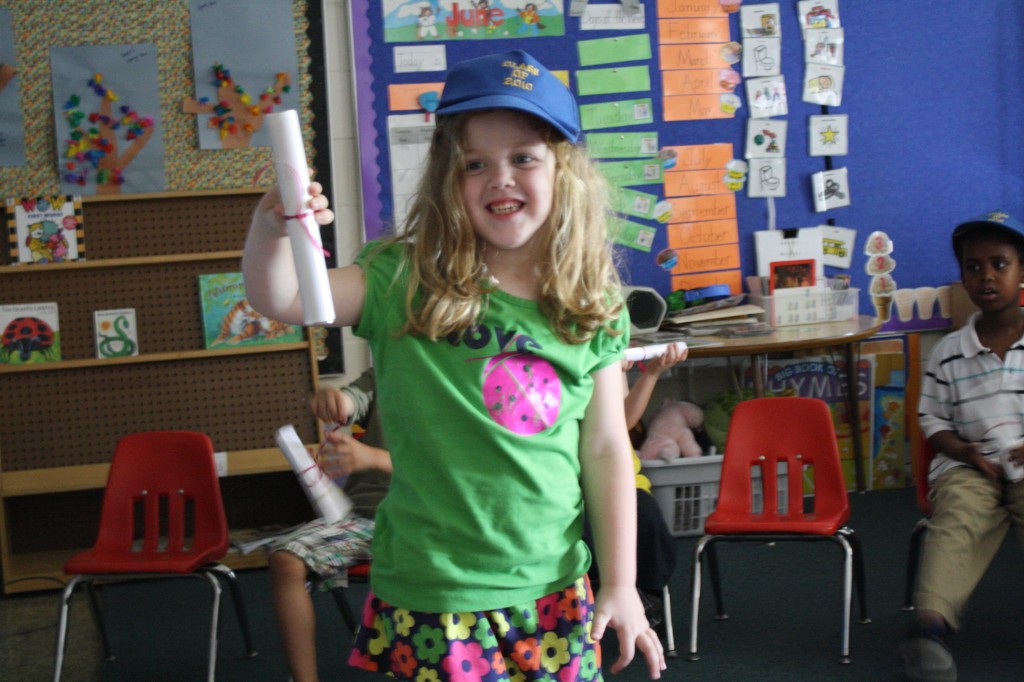Last week, Aaron and I met with Cordy’s teachers for her annual IEP review. I know many parents who have felt like they needed to armor-up and prepare for battle before walking into their child’s IEP meeting each year, but we’ve always been fortunate to have never felt that way. Our school has always been welcoming to special needs, and I feel like the staff there genuinely wants to do whatever is reasonably in their power to help Cordy succeed.
It’s one more reason why I believe Cordy’s special-needs preschool teacher should be on the list for sainthood. If it wasn’t for her, and her incredible ability to look deep into this child and see her potential, we wouldn’t be at this elementary school. Yes, it’s on the other side of Columbus from us, but her preschool teacher knew the right school for Cordy and made sure it happened.
That’s not to say there haven’t been bumps in the road. Cordy has thrown some challenging behaviors their way at times, and there have been a couple of teachers that she did not click with at all. But in general, the school has been tolerant, gentle in discipline, and works hard to understand her unique quirks.
So really, we don’t mind attending IEP meetings. When Cordy was first given an educational diagnosis of autism at three years old, her future was murky at best. The special needs department couldn’t promise that she’d ever be in mainstream classes, or have any chance of graduating from high school, much less attend college. But thanks to the early intervention in preschool, we quickly learned how much she was capable of, and her preschool teacher told us she had high hopes of her being fully mainstreamed at some point.
Her current school agreed with her preschool teacher’s analysis. While she missed the mark to be fully mainstreamed in kindergarten, she did have some inclusion time with a kindergarten class, and otherwise had one-on-one teaching with her special needs teacher, Ms. M. I was disappointed at the time, but it turned out to be the best possible arrangement for Cordy. Because of the one-on-one teaching, Ms. M began to see just how bright Cordy was, and began suggesting to us that she was gifted. She taught her at an advanced level, which eventually led to being tested for gifted identification in math and reading.
At this point, Ms. M gave us more hope: this child will graduate from high school, she told us, and there’s every reason to believe she could go to college. She said she was always cautious to make that kind of a prediction, and that she’s never been wrong.
In first grade, Cordy was fully mainstreamed, and this teacher also saw that she needed an advanced curriculum. Keep her challenged at the right level, and Cordy’s too engaged to let her anxiety bother her as much. In second grade, she started going to third grade for reading, and was further evaluated for gifted services. It was also during this year that Cordy was due to be re-evaluated by the school psychologist to determine if she was still eligible for special needs services.
This was a big year. Cordy was identified as superior cognitive by the gifted department (to go along with already being identified as gifted in a handful of subject areas), and the psychologist confirmed her high IQ, saying it was the highest he had ever scored an elementary school student in eleven years. She still met the requirements for special needs, too, primarily due to her severe anxiety and deficit in social skills.
So coming to the table again last week for her IEP meeting was something we looked forward to. Cordy is in a self-contained gifted education classroom this year, which we hoped would keep her engaged enough to keep her sensory issues and anxiety in check. The transition at the start of the year was very rough, though. Previous classes hadn’t provided the same level of challenge to her, so she was scared by suddenly being forced to work hard in class. This led to escape attempts – mostly asking to go to the bathroom where she would hide out for 10-15 minutes to avoid classwork. Her team (including her external team of her pediatrician and her psychologist) worked together to find ways to reduce this behavior and help her feel more comfortable in the class.
During the IEP meeting, we learned that the adjustments made by her team are working and that she has been doing better in class. Her gifted teacher said she could see Cordy was putting more effort into her work and trying to keep her anxiety in check. Her special needs teacher said that she hasn’t seen her as much in the last two weeks, but that Cordy still has her “take 5” pass she can use to visit the resource room whenever she feels she needs a break. Both teachers, who happen to have rooms right across the hall from each other, have collaborated to ensure that Cordy’s special needs – on both ends of the spectrum – are being met, with each handling her area of expertise.
This is individualized education at work. Two teachers, both contributing to Cordy’s education in their own areas, working together for continuity, and sharing what’s working and what isn’t working with each other. During the meeting, both teachers expressed that they are really enjoying working together for Cordy, and they feel it’s having a positive effect.
One funny story shared from the meeting (because every teacher at this school has a “Cordy story”): her gifted teacher told us that one day it was announced that there would be a meeting after school in her classroom. Cordy asked what they were meeting about. Her teacher, knowing that Cordy has recently been trying to learn humor and had been saying funny things to the teacher lately, replied in a joking manner, “Oh, we’re all meeting to talk about you, Cordy, and everything you’ve been doing wrong.”
Cordy completely fell apart, of course, unable to get the joke, and the teacher was left to backpedal and reassure her that she was just joking. Afterwards, she told the special needs team what happened, and they looked at her in shock and said, “Nooooo! Why did you think that would be okay? She doesn’t understand when you’re joking about her!” Cordy’s teacher did apologize to Cordy for upsetting her, and she told us it was a good lesson learned about just how far she could go with humor around Cordy. Yep. The kid still can’t handle sarcasm or any humor about her.
On the not-so-funny side, we learned that Cordy is still struggling in math, and her fear of math is what has prompted the most anxiety attacks. It seems last year’s battle with math is still with her. It’s so frustrating that a kid who is gifted in math is having so much trouble with it. Had she only learned one way of doing problems, instead of needing to be taught and reinforcing several different models, she probably wouldn’t be so confused.
She’s still having trouble with executive functioning skills, too, often forgetting to bring everything she needs home or write down everything she needs to do. We discussed ways to help support this, with additional accommodations possible if it gets worse. On the upside, all kids in this class are learning to play chess this year, and Cordy not only loves to play chess, but seems to have a talent for it.
The hardest part for me, though, was when I asked if she has any friends in the class. There are kids who are friendly with her, we were told, but she doesn’t appear to have any friends. I knew this would likely be the answer, but it was still hard to accept. Cordy doesn’t have any good friends, at school or in our neighborhood. That could partially be our fault, for not trying to encourage more playdates, but Cordy also struggles with knowing how to be a friend. Her thinking can be so rigid at times that many kids don’t want to be friends with her.
She attends a social skills class once a week, which has helped her conversation skills, however I think she feels it’s too much effort to make friends and so would rather be by herself where she doesn’t have to work to be more neurotypical. Her teachers are aware that I want her to develop friendships, and her gifted teacher believes that she might find friendships through playing chess or other shared interest activities in the class. Many of the kids are nice to her – there’s just no visible desire to want to spend a lot of time with her.
We wrapped up the meeting by going over her goals for this period and making some adjustments. I’ll add it’s not a perfect IEP meeting. There are still many areas I feel aren’t covered well enough, but it’s not due to lack of interest from the teachers, but lack of school resources. Ideally, her class would have textbooks so she could read the material they’re learning instead of relying more on auditory teaching. (She is a poor auditory learner, but picks up anything she reads in a book.) But there are no textbooks or written materials for the kids to use for many subjects.
And ideally she’d have an aide with her more during the day to help support her when she hits the wall with anxiety, but that’s a battle waged by many parents before us with poor outcomes. I don’t have the energy to fight on all fronts – we must choose our battles and right now this isn’t one to put my energy into.
So, we make due with the limited resources and cherish and support the best resources we do have: her teachers, her aides (when she does occasionally see them), and her principal. Unfortunately, her principal will be retiring soon, so next year’s IEP meeting may be an entirely different situation depending on who the district chooses for the position. (And oh, I’ll be ready if they put up any resistance to the sunny collaboration we’ve got going on at the moment.)
For now, things are going well. Cordy is struggling a little in her class, but just like years before, I think she’ll rise to the challenge and grow from this experience. For a kid with such an uncertain future at the start of her school years, she’s making it clearer with each new year that she’s capable of so much.
 This year’s school photo. (Ignore the flash screen reflected in her glasses.)
This year’s school photo. (Ignore the flash screen reflected in her glasses.)



No textbooks?!